Who Should See Greta Gerwig’s ‘Barbie’?
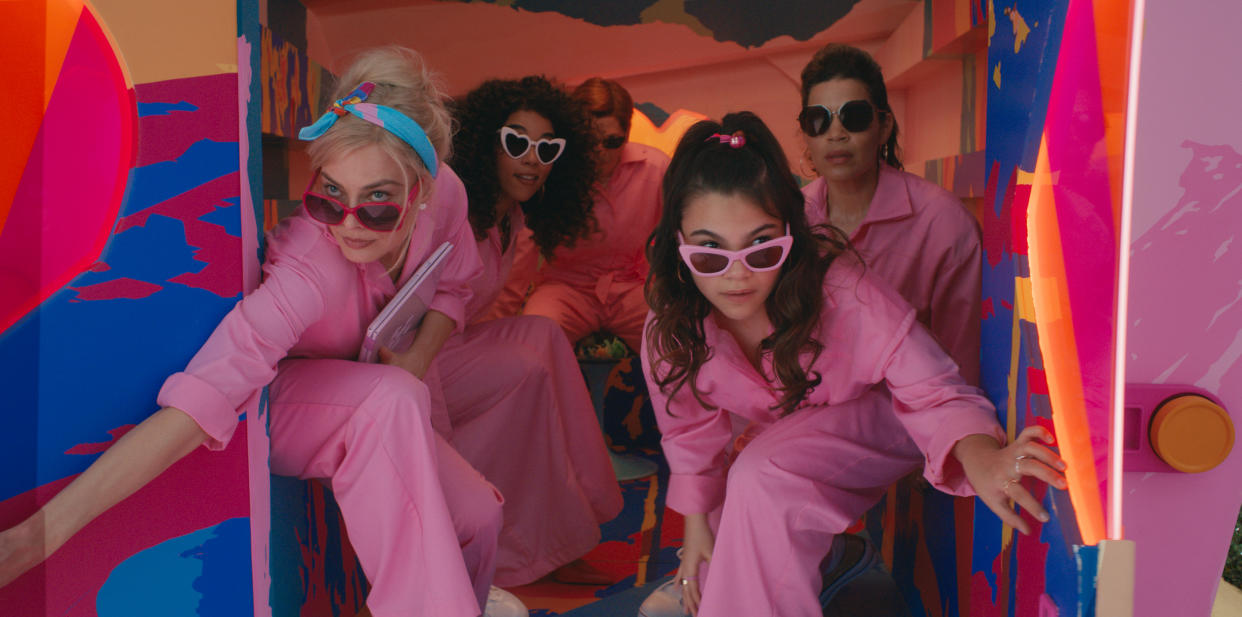
- Oops!Something went wrong.Please try again later.
- Oops!Something went wrong.Please try again later.
This weekend sees the release of Greta Gerwig’s wildly anticipated “Barbie,” the ambitious neon pink comedy from the Oscar-nominated filmmaker. That much is clear, but defining the core audience for “Barbie” isn’t so simple. The movie is somehow both a story of the beloved child’s toy and a satire of its cultural impact. It’s rated PG-13, but draws on a commercial product most closely associated with childhood. It stars decidedly grown-up performers Margot Robbie and Ryan Gosling, but it’s about a world in which Barbie and Ken dolls are real. It’s produced by Mattel, but it’s co-written by Noah Baumbach. So, who is this film for?
IndieWire’s Kate Erbland, Eric Kohn, and David Ehrlich all recently saw “Barbie,” and they’ve got some ideas as to how to answer all that, and more.
More from IndieWire
'Barbie' and 'Oppenheimer' Both Receive A Grades from CinemaScore as Fans Flock to Double Features
Benny Safdie Ate Probably 30 Tiramisus While Filming 'Licorice Pizza' Dinner Scene
KATE ERBLAND: Let’s parse this: It’s a “Barbie” movie, yes, but it’s also rated PG-13 (for “suggestive references and brief language”), which is probably going to be the first indicator for many potential viewers (including families and kids) that this “Barbie” is quite unlike the many animated outings previously inspired by the beloved doll. (Those films, of which there are dozens, have been in circulation for over two decades and show no sign of slowing down; they’re probably the best bet for the youngest of Barbie fans as of this moment.)
Even the film’s marketing has leaned on the apparent dissonance between subject and object, as an April trailer teased, “If you love Barbie…if you hate Barbie, this movie is for you.” What if I don’t have any feeling toward Barbie? Chances are, there are not many people who fall into that category and Gerwig’s film is wise to orient itself to the two larger camps: Barbie lovers and Barbie haters. Both of them are represented in the film, both of them make sage points in the film, and both of them are integral to the story that Gerwig and Baumbach tell here. They’re inextricable.
Still, I think the people who will most enjoy “Barbie” (which is, at its heart, a hugely enjoyable and funny film) are the ones who have even the smallest of soft spots for the doll and her lore. That includes not only adults (though, yes, mostly adults), but even precocious tweens and smart teens who want a generous dollop of smarts in their comedy. Knowing Barbie lore certainly helps when it comes to some of the film’s best jokes, which range from gags about discontinued dolls to taking the Barbie Dream House to its logical (but also baffling) ends, but it’s not required to vibe with the film in its entirety.
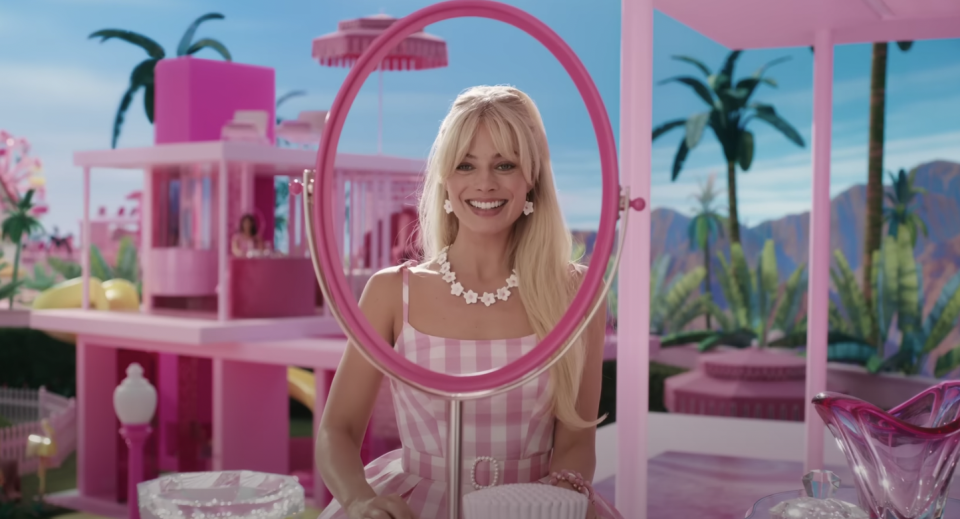
Should children see it? A friend just asked me if she could take her nine-year-old daughter this weekend, and I considered for a moment, and went ahead with my recommendation: yes, because I know her mother (also an entertainment reporter; hi, Kim!) is a savvy and smart consumer who will be able to answer any queries her kid might have. It’s not a plop-the-children-in-front-of-the-screen-and-walk-away experience; it fares better with a little discussion and thought.
At its heart, “Barbie” is well-crafted and endlessly clever, the kind of thing plenty of movie-goers should be able to enjoy, but the messaging so far hasn’t quite been able to sell that (we’re still betting a raft of very confused parents are going to come tumbling out of their weekend screenings, shocked kids in tow). Final vote: It’s for just anyone who likes to laugh and to think, but take that PG-13 rating as an easy guidepost when it comes to the age the cinephiles you’re toting along with you.
ERIC KOHN: I would argue that even as “Barbie” aims for mass appeal, its true audience is far narrower. This movie takes the IP game to a very esoteric place — and of course I’m there for it! But let’s call a spade a spade: “Barbie” integrates the syllabus for a feminist theory course into an unadulterated advertisement for a toy factory. Gerwig’s candy-colored crowdpleaser manages to criticize the very same IP that allows it to exist. That’s a tough pill for mass audiences to swallow.
The movie is heavy-handed in its rhetoric, but often charming because of that. It’s a giant wink to the audience and the butt of its own joke. It’s not quite what critic Manny Farber deemed termite art, but it certainly nibbles at the boundaries of blockbuster formula, as Gerwig and her ever-devout co-writer Noah Baumbach have had a blast lambasting the history of Barbie as a false idol of female progress in a male-dominated world.
It’s not the “Barbie” movie that would have been made a generation ago, that’s for sure, or even a few years back when Margot Robbie was overly sexualized in “The Wolf of Wall Street.” As a producer-star of “Barbie,” she’s exacting revenge.
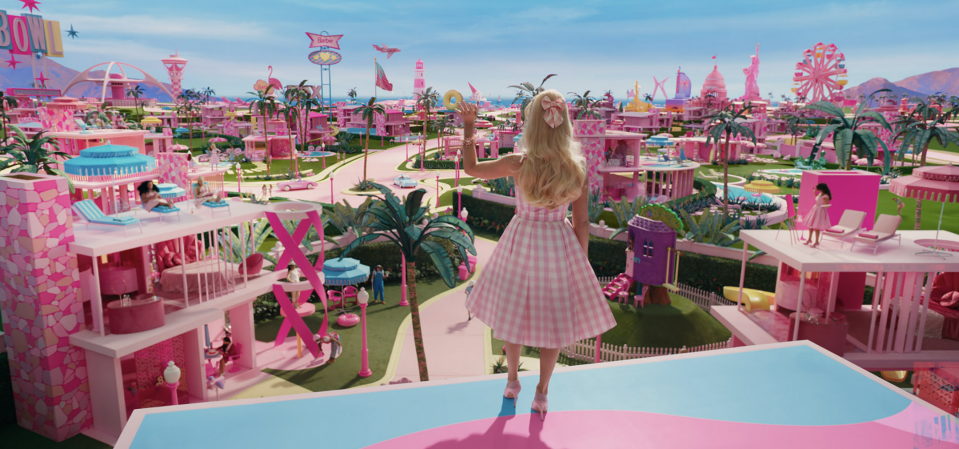
So, who is “Barbie” really for? The easy, reductive answer hews to the smaller end of the film culture spectrum: Us, of course. Lots of highbrow New Yorkers, musical buffs, “Lady Bird” fans, people who like their pop culture doused in ironic asides. It’s queer as hell and the gays will eat it up. Gerwig’s an auteur and this is a genuine critic’s movie.
But given that it’s also a multimillion-dollar behemoth, the answer is even more complicated than that.
To my eyes, “Barbie” is a funny, silly-smart effort to define monoculture in the 21st century, as it seeks to find a sweet spot that can entertain both teens and older audiences with a sensibility that splits the difference. You can feel that goal in the filmmaking itself. It’s an attempt to deliver a snazzy spectacle with an undercurrent of big, bold ideas, the boldest of which is that your average moviegoer just looking for a good time could experience as much of a wakeup to the “real world” as Barbie does over the course of the movie.
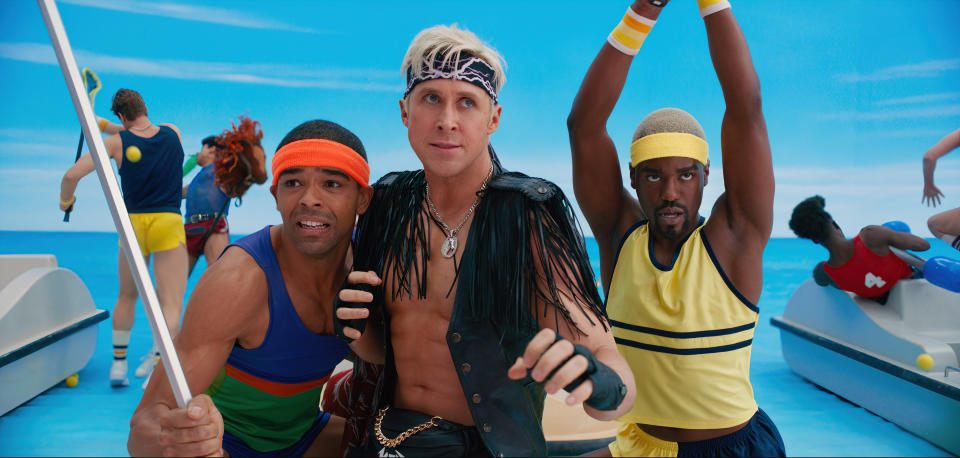
I say it’s an “attempt” because I don’t think “Barbie” really does that. It’s such a searing takedown of the patriarchy that it could alienate the many people who embrace certain patriarchal ideas. It goes hard, in some hilarious ways, on the idea that traditional notions of masculinity have done more to damage contemporary society than Barbie itself. I mean, Ken really sucks, and not in a familiar movie bad guy way (Ryan Gosling was born to mock his machismo as hard his does here). There’s very little about Ken’s sad-man arc that registers in traditional tentpole language.
That extends to “Barbie” as a whole. In the pantheon of IP money-grabs, the playbook here is more Laura Mulvey than “The Lion King.” I’m rooting for “Barbie” to succeed, but I doubt it will in the long term with a vast audience of viewers who feel threatened by any kind of narrative that questions their worldview. And I’m cool with that, because, you know, fuck those people. Still, though: Once the pink smoke settles, I think “Barbie” is a tough mainstream sell. What say you, David?
DAVID EHRLICH: Truth be told, the “who is a movie for?” discourse has always struck me as essentialist claptrap — the kind of thinking that diminishes art’s power to defy preconceived notions and activate people in the most unexpected of ways. Filmmakers may have a certain audience in mind, but that may not be the audience they reach. Marketers definitely have a certain audience in mind, but they’ll happily take money from anyone who comes in the door. It didn’t occur to me that “Barbie” might be thought of as a “kids’ movie,” and I still don’t get that vibe; if anything, it feels like a throwback to the kind of four-quadrant summer comedies that ruled the ’90s (“Austin Powers” comes to mind, and not only because I’d kill to read his “Barbie” reaction).
And while it seems pretty obvious that Gerwig is courting a female crowd who might resonate with America Ferrera’s big monologue and, um, the lingering sense that their kind has been objectified by men for the entire history of our species (give or take), every guy who grew up with a sister knows that Barbie belongs to whoever steals her when their sibling isn’t looking. Is Leonardo supposed to go to the big dance at the Technodrome without a date!?
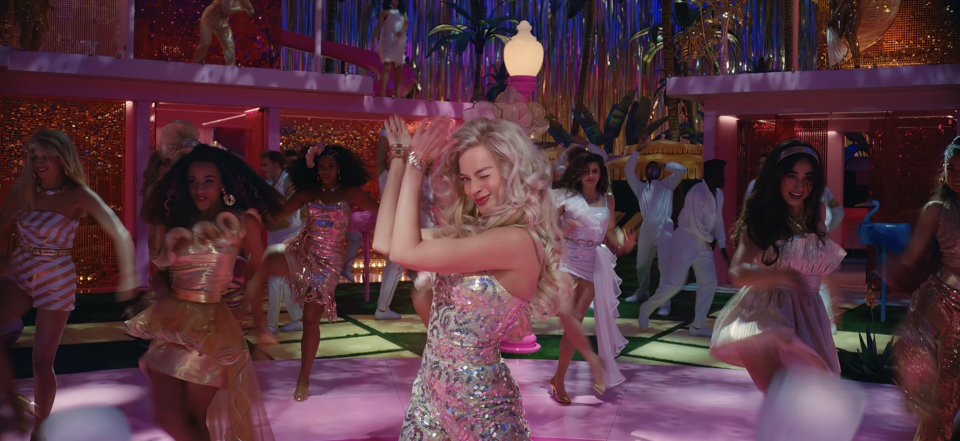
Don’t be insane. Which brings me to my next point: It’s stupid that “Barbie” and the forthcoming “Teenage Mutant Ninja Turtles: Mutant Mayhem” are two separate movies. I didn’t care that those brands were owned by different companies when I was a kid, and I sure as shit don’t care now.
But for all my big talk, I did actually spend most of “Barbie” thinking that it was made for a particular group of people, if only because I don’t think I’d ever seen an $100 million summer movie that so aggressively catered to them before. And by “them” I mean “me,” and by “me” I mean “elder millennials who respond to certain Matchbox Twenty songs as if they were Proustian Madelines. The fact that so few of us actually liked Matchbox Twenty only makes it funnier. Gerwig’s film is littered with references that will appeal to a wide cross-section of audiences (some of the jokes target cultural touchstones that are only a couple of years old), but so much of its vision feels shaped by/in response to growing up in the poptimistic shadow of a mainstream that sincerely believed that naming problems was the same thing as solving them.
I know what you’re thinking: A Greta Gerwig movie informed by her formative years??? That would never happen. But with all due respect to higher-brow inspirations like “The Umbrellas of Cherbourg” and “All that Jazz” (both well-founded!), I think there’s a reason why this movie’s closest relative might ultimately be 2001’s “Josie and the Pussycats” — “Barbie” sends up corporate feminism in much the same way that movie satirized the music industry. For all of the impact that current thirtysomethings have already had on Hollywood, “Barbie” struck me as a singularly clear “my generation has ascended to the heights of Hollywood power,” moment.
I’m letting myself get hung up on this point because it brings us back to the movie’s animating tension: Plastic is forever, but culture never stops evolving. As much as anything else, “Barbie” is a film about how yesterday’s symbol of girl power can become tomorrow’s emblem of objectification. It’s a film that recognizes how the relationship between representation and reality is a two-way street (we see Barbie and Ken go down it and back again several times over), and I think it should resonate with anyone who’s been alive long enough to see the world change through the prism of their favorite childhood toys. Because this isn’t just a millennial’s reflection on Barbie, it’s Barbie’s reflection on millennials.
A Warner Bros. release, “Barbie” is now in theaters.
Best of IndieWire
Where to Watch This Week's New Movies, from 'Barbie' to 'Oppenheimer'
The Best Sex Scenes of the 21st Century: 'Beau Is Afraid,' 'Call Me By Your Name,' and More
Christopher Nolan's Most Essential Collaborators, from Cillian Murphy to Ludwig Göransson
Sign up for Indiewire's Newsletter. For the latest news, follow us on Facebook, Twitter, and Instagram.

